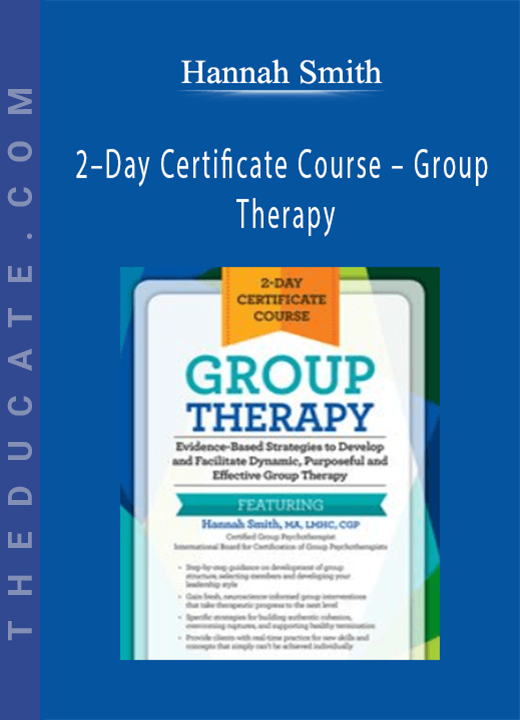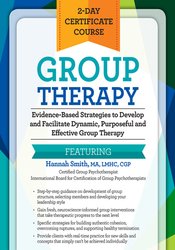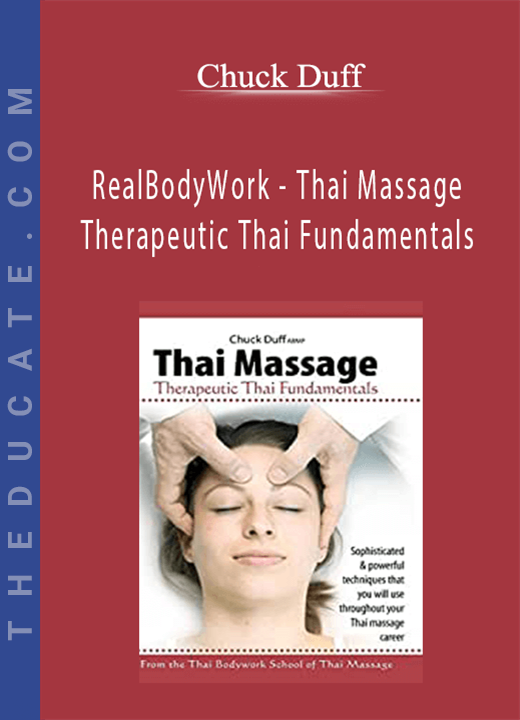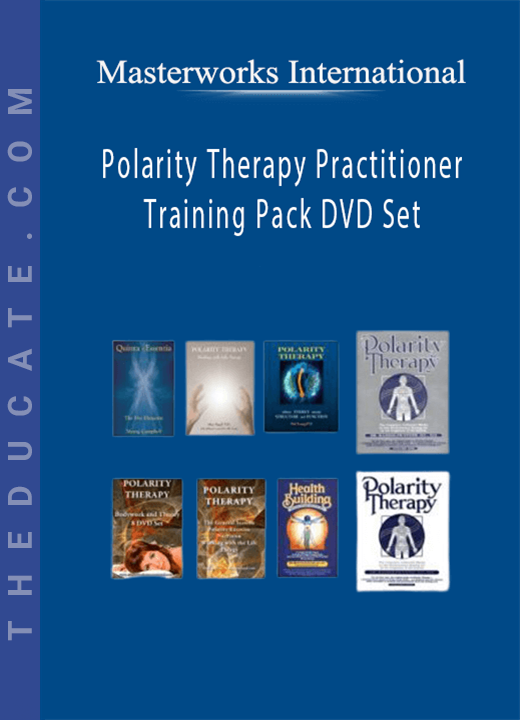Description
- Faculty:
- Hannah Smith
- Duration:
- 11 Hours 52 Minutes
- Format:
- Audio and Video
- Copyright:
- Aug 12, 2019
- The evolution of group therapy practices
- Current trends in research and evidence-based treatment
- Benefits and barriers of a healthy group experience
- Therapeutic application of the Polyvagal Theory
- The role of interpersonal neurobiology
- Attachment and attunement
- Comorbidity between attachment and DSM-5® diagnoses
- What the research tells us about the benefits of group therapy
- Building new neuropathways
- Platform for modeling secure attachment-based interpersonal behavior
- Reduce shame and increase sense of acceptance, connection and self-worth
- Real-time practice and feedback for skill building
- Current research, potential risks & limitations
- Modern psychoanalytic
- Systems-centered
- Expressive
- Cognitive-based
- Group types and functions: psychoeducational, process, cognitive, expressive and more!
- Group structure considerations: logistics, duration/frequency, open/closed
- Topic, approach, rationale for group
- Member selection
- Consideration of unique client needs
- Who is not appropriate for group therapy?
- Engaging the skeptical/resistant client
- What to do when the members are chosen for you
- Yalom’s 11 therapeutic factors
- Going beyond “forming, norming, storming and performing”
- Agreements and goal setting
- Stages of group development
- Sub-grouping
- ”Leveling out”
- Synergizing
- Strategies to build immediacy, reciprocity, bridging
- How to navigate transference/countertransference
- Managing threats to cohesion:
- Micro-aggressions
- Affective dysregulation
- Resistance
- Aggression/passive aggression
- Absenteeism/tardiness
- Other therapy-interfering behaviors
- Vertical v. horizontal group cohesion
- The therapeutic value of silence
- Degrees of empathy
- Ongoing evaluation and responsive modification
- When, how, and why group therapy ends
- Common client reactions to termination (and how to handle them)
- Grief
- Ambivalence
- Denial
- Regression
- And more!
- Rituals and celebrations
- How to facilitate a healthy goodbye process
- Evaluation methods & tools
- Debriefing and self-evaluation
- Troubleshooting common issues and pitfalls
- Comprehensive informed consent
- HIPAA/confidentiality considerations
- Dual relationships/conflicts of interest
- Boundary setting
- Therapist use of self-disclosure
- Maintaining professional standards
- Providing ethical evaluation and course correction
- Documentation considerations
- Crisis management
- Setting-specific concerns
- Modifications for children and adolescents
- Special populations
- School-based groups
- Tips for getting institutional support of the group model
- Multicultural factors
- Crisis management procedures
Hannah Smith – 2-Day Certificate Course – Group Therapy: Evidence-Based Strategies to Develop and Facilitate Dynamic, Purposeful and Effective Group Therapy
Description
Do you want to have a greater impact on more clients in a shorter amount of time? Do you want to do this with the confidence that up-to-the-moment, neuroscience-informed treatment bring? Then you want to use the powerful tool of group therapy.
Current neuroscience research has proven that humans are biologically relational at our core. It is becoming more and more evident that attachment issues are often comorbid to many of the mental health disorders that drive our clients to seek out help. This means that the group setting is an even more powerful tool than we ever thought before in the treatment of anxiety, depression, personality disorders, trauma and more!
This recording will advance the modality of group practice into the modern age! If you are new to group practice, you will walk away with a solid framework for creating an effective group. “Old hands” at group practice will acquire contemporary understanding that will challenge and invigorate the imagination. Experientially, as a group ourselves, we will explore and analyze methods and techniques that address common issues faced in a variety of settings.
This is not “just another training program”. Hannah’s goal is not only to inform but to motivate and energize clinicians to return to their practice with greater confidence, enthusiasm and creativity.
If you are looking for a learning opportunity that is also stimulating and fun, then this is the recording for you!
Handouts
| Manual – Certificate Course Group Therapy (9.25 MB) | 98 Pages | Available after Purchase |
Outline
Group Therapy Today: Advances in Research and Efficacy of Treatment Approaches
Neuroscience-Informed Group Therapy: How Brain-Based Group Interventions Improve Outcomes
Evidence-Based Models of Group Therapy: Find the Right Fit for You and Your Setting
PRINCIPLES & GOALS FOR EFFECTIVE GROUP PRACTICE
Pre-group Development: Setting the Stage for Success
Group Therapy in Action: Strategies for Building Cohesion, Trust and Therapeutic Progress
Termination: Techniques for Facilitating a Healthy Transition and Continued Therapeutic Progress
Post-Group Evaluation: Essential Steps for Improving Efficacy of the Group Model
Ethical and Legal Issues Specific to Group Therapy: Protect Yourself, Manage Liability and Provide Quality Care
Clinical Considerations
Faculty

Hannah Smith Related seminars and products: 2
Potential Finders
Hannah Smith, MA, LMHC, CGP, is the founder of Potential Finders and is the group therapy program coordinator in a top partial-hospital rehabilitation treatment center in the Seattle area. She holds Masters degrees in both special education and counseling psychology and has nearly 20 years of experience both in the US and abroad. Her educational work has been with disorders of cognition and communication, where the role of the brain in learning and memory were primary areas of focus. Clinically, her practice is primarily devoted to the treatment of people recovering from trauma and anxiety disorders. Her experience, both personally and professionally, has allowed her to develop an expertise in incorporating neuroscience into therapeutic interventions in innovative ways. Hannah guest lectures in academic and clinical settings on a variety of topics related to neuroscience and the treatment of anxiety, trauma, and emotion regulation. She is an engaging presenter whose passion is to educate clinicians on practical, whole-person approaches and applications in therapy.
Speaker Disclosures:
Financial: Hannah Smith is the clinical supervisor at The Center; A Place of Hope. She receives a speaking honorarium from PESI, Inc.
Non-financial: Hannah Smith has no relevant non-financial relationship to disclose.







8 reviews for Hannah Smith – 2-Day Certificate Course – Group Therapy: Evidence-Based Strategies to Develop and Facilitate Dynamic, Purposeful and Effective Group Therapy
There are no reviews yet.